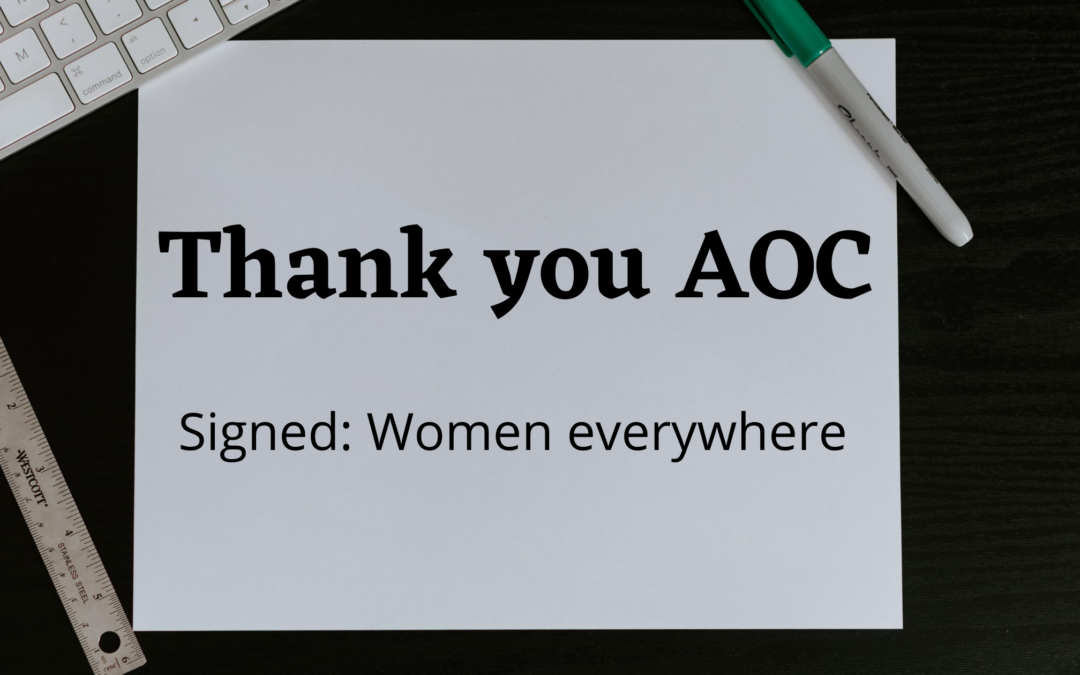- Anti-Racism Tip #8: If It Needs a Disclaimer, Don’t Say It - October 18, 2022
- On Tender Moments that Take Us By Surprise - May 18, 2022
- Finding Creative Ways to Exercise During the Pandemic - April 29, 2022
This week many of us watched Representative Alexandria Ocasio-Cortez (AOC) respond to Representative Ted Yoho’s empty apology for the hateful, denigrating comments that he hurled at AOC on the steps of the Capitol, where the US Congress meets. AOC’s response was a powerful commentary on the systemic nature of sexism, including the way misogynistic language (ie language that is strongly prejudiced against women) is routinely used by powerful men to try to undercut powerful women and the way men attempt to minimize and normalize the harm of this language.
Her ten minute response was carefully and gracefully communicated. AOC maintained a great deal of composure at a time when anger would have been both appropriate and understandable. Her powerful statement denouncing toxic masculinity and the routine denigration of women was applauded by women everywhere because, unfortunately, so many women have had similar experiences.
Now I don’t know AOC and I cannot know her entire thought process in preparing for that speech. This article, however, does provide an important glimpse into some of her thoughts going into it:
…this speech was about holding myself accountable as much as anyone else. Because my first instinct was to let it go. It was my second instinct, too. It was only when sisters like @ayannapressley, @rashidatlaib, @repilhan and friends like @repraskin reminded me how unacceptable this all was that I started to think about what I would have done if this abuse happened to any other person BUT me. That is when I found my voice. Why is it okay to swallow our own abuse, yet stand up for others? I needed to learn that by standing up for ourselves, we break the chain of abuse and stand up for every person after us who would have been subject to more of the same with lack of accountability.
By standing up, as she did, AOC provided a powerful, courageous example of calling out sexism at the highest level. AOC’s statement, however, can also teach us about racism and intersectionality. As many of you know, intersectionality is a term coined in 1989 by professor Kimberlé Crenshaw to describe how race, class, gender, and other individual characteristics intersect with one another and overlap to make people’s experiences of discrimination different from one another and potentially more complex because of the intersection of a person’s various identities. (If you’re interested in learning more, see this critical and thoughtful article about debates about intersectionality.)
In delivering her remarks in a composed and professional manner, AOC was careful in presenting herself as a calm, collected racialized woman. She is undoubtedly aware of the pervasive negative stereotypes of Latina and other racialized women as loud, irrational, biased and angry. Her careful delivery completely countered this stereotype.
I am a racialized woman who works alongside thoughtful, inspiring racialized and Indigenous colleagues to deliver anti-racism training. In talking about how to effectively deliver this training, we talk a lot about whether we need to be careful not to present as angry because people will stop listening and dismiss our perspectives based on harmful negative stereotypes. So as I watched AOC’s response, I noticed how careful she was to counter these stereotypes and universalize the insulting and denigrating experience she had as an all too common experience for women.
What she left out, however, is equally powerful. She didn’t mention that Yoho is White and she is racialized. She didn’t raise questions about whether Yoho’s actions may have, in part, been motivated by racism.
I think she made a good choice. The sexism underlying Mr. Yoho’s statements was explicit and unassailable. And it was completely unacceptable.
The racism that may have motivated Yoho’s statement is less obvious. And you never know, AOC may be aware that here in Canada, we have recently seen how Jagmeet Singh’s courageous act of calling out racism in the House of Commons resulted in him being both silenced and excluded from continuing to participate in government.
The question of whether Yoho’s actions were at least in part motivated by racism illuminates a central aspect of White privilege: when a racialized or Indigenous woman experiences sexist treatment, there is always the lingering question of whether that treatment may also have been motivated by racism. If Yoho had attacked a White female Representative in the same way, there would have been no question that his actions were attributable solely to sexism and misogyny (absent any other intersecting identities of course). Because AOC is female AND racialized, however, the lingering question remains about whether his attack may also have been fuelled by racism.
AOC’s experience is certainly an experience common to most women. It also illuminates the more complex experiences that racialized women have in unpacking instances of sexism. We are often left with this extra layer of wondering. We are left wondering about whether the insulting treatment was motivated by sexism or racism or both.
AOC‘s words, her actions, and her grace provide a powerful and inspiring example of how to stand up against and call out discrimination. She is the kind of role model women and girls need. She reminds us of the importance of standing up for ourselves and not tolerating degrading, disrespectful, sexist behaviour from anyone. She also reminds us that by standing up, we are potentially protecting others from the same discriminatory treatment. And importantly, AOC clearly and concisely reminds us that sexism should not be tolerated FULL STOP, including from powerful men.
As a racialized woman, I’m inspired by AOC’s courage and willingness to speak truth to power. I’m inspired by her willingness to stand up and expend her emotional and mental energy to call out sexist behaviour. I do wonder, however, if AOC also has that same lingering question in the back of her mind: Was Yoho’s sexist attack on AOC also racist? I guess we’ll never know.
We would love to hear your comments in the section below. And if you liked this article, share!


Powerful analysis. You are right. It was much more powerful leaving out the racial element. Usually when that is brought into play, there is denial AND accusations of over-sensitivity, even that we are “inventing” or seeing something that is not there. And sometimes, it is so deeply rooted that the other does not recognize it
Sexism was explicit.
As racialized women, we have both elements in play. I think it is important to tackle the explicit ones clearly and rationally as AOC did so eloquently. I stood up and cheered when I heard her on TV!!
Yes, her statement was awesome! And you’re right, because racism is so insidious (just like many of the “isms”) it is not always even recognized by the person doing it as racism. That denial that would have definitely happened is part of what makes dismantling racism so difficult. And interestingly, it seems the world is ready to acknowledge systemic and individual sexism more easily than racism.